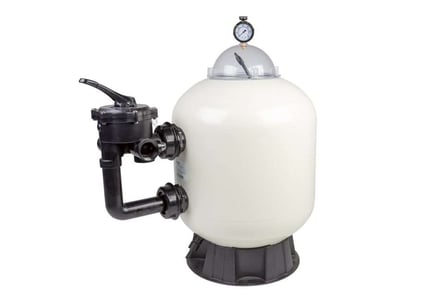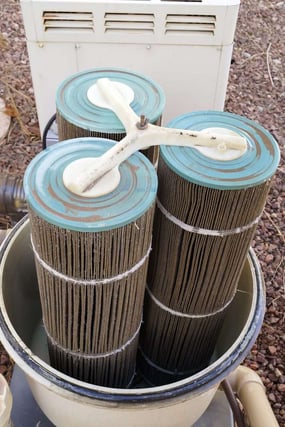The Ultimate Guide - Swimming Pool Filter Systems
A lot goes into keeping your pool crystal clear. While water sanitation like salt, chlorine, UV etc. keeps your pool free of bacteria, parasites, and viruses it’s the pool filter that does the most to keep your pool looking clear.
There are three types of pool filters commonly seen in the residential pool market today: Sand Filters, Cartridge Filters, and Diatomaceous Earth (DE) Filters. We include a Cartridge Filter in every cost estimate as a standard option.
Sand Filters
The traditional and most commonly known swimming pool filter system is a sand filter. Most people probably think of the round, barrel-looking can with the big handle on top when they think of pool filters which is what is known as a Sand Filter.

You can probably guess what a Sand Filter uses to clean particles from your pool’s water… It’s sand! Not just your regular beach sand though, a Sand Filter is filled with #20 Silica Sand which is found at most hardware stores or sand and gravel pits. In this system, your pool pump draws water from the skimmer and pushes the pool water into the top of the Sand Filter, through the sand which traps particles about 20-40 microns in size, the water continues to the bottom of the filter where plumbing sends the water out of the filter and back into the pool through the return lines.
Unfortunately, it’s not as simple as setting the filter up, turning it on and enjoying your pool for the rest of the time, there is some work required with these systems. When you vacuum your pool or there is more debris in the water than normal, you need to manually backwash the filter. The sand in the filter becomes dirty and plugged up after vacuuming your pool or filtering more particles and water can’t pass through causing the pressure in the filter to increase. Backwashing clears the sand of most debris and lowers the pressures back to normal levels, but it’s not possible to completely clean the sand by backwashing. Every 5-7 years, the sand in your filter has to be replaced with new sand.
Pros
- Lowest upfront cost
- Fairly easy to maintain
Cons
- Least effective filtration (20-40 microns)
- Waste of over 1000 gal per season in backwashing
- Requires draining and replacement of sand
Cartridge Filters
These swimming pool filter systems are becoming increasingly popular in the market and for good reason. They have a similar appearance to a traditional Sand Filter, but they are very different inside.

Cartridge Filters work much like a common air filter you would find in your car or HVAC system. These systems consist of polyester filter cartridges that are contained in the filter unit.
These cartridges are removable and just like the filters in your home or car, they need to be changed periodically, but they can be cleaned several times before needing replacement.
Instead of sand, water is forced through the filter cartridges and particles 5-25 microns in size (much finer than a Sand Filter) are caught in the filter. Once passing through the filter, water is pumped back into the pool.
Unlike a Sand Filter, you do not need to backwash at all. Instead, you will need to remove the filter cartridges about 1-2 times during the season when filter pressure increases, and clean them with fresh water before returning them to the filter. If you thoroughly clean and maintain your cartridges, they should last about 5 years before they need to be replaced with new cartridges. New cartridges can cost a few hundred dollars per cartridge, most use multiple cartridges.
Cartridge filters also require far less pressure than a sand filter to push water through the filtering medium meaning that your pump doesn’t have to work as hard to pass the water through the filter which in turn should help to extend the life of your pump and use less electricity.
Here at Hipel Pools, we prefer to use cartridge filters and include them as standard in every fiberglass pool installation
Pros
- No backwashing required
- Increased effectiveness (5-25 microns)
- Filters can be cleaned
- Operate at lower pressure
Cons
- Slightly higher upfront cost compared to Sand Filters
- Requires replacement of cartridges
Diatomaceous Earth (DE) Filters
Ever heard of this before? Probably not, and that’s okay – until getting into the pool industry, I had no idea what these were… or how to say it. DE Filters are made up of internal grids or fingers that are covered by a fine powder called Diatomaceous Earth which is a fossilized algae that is ground up to a powder. This powder is sold separately from the filter, and you’ll need to have it on hand.
DE Filters work by forcing water through the DE powder-coated grids or fingers. The powder filters particles 1-3 microns in size from passing through before the clean water is returned to the pool. These filters stop particles which are so small they can’t even be seen by the human eye.
Just like a Sand Filter, DE Filters have to be back washed after vacuuming or when there is more debris in the pool than normal. Unfortunately, backwashing these filters will also backwash the DE powder. After every backwash, you will need to replace the DE powder by pouring it into the skimmer where it will be caught by the grids or fingers of the filter.
While DE Filters provide the highest water quality, there are some things that you will have to consider before thinking of installing one. DE powder may be difficult to get rid of. Some municipalities don’t allow you to dump the backwash powder into the storm sewer and you should never dump it into natural waterways like rivers or creeks. Disposing of the backwash could be an issue for you. Additionally, the grids or fingers inside the filter require annual cleaning and soaking in a cleansing solution.
Pros
- Most effective filter (1-3 microns)
Cons
- Highest upfront cost
- Requires most maintenance
- Requires backwashing
- Possible disposal issues
- Requires frequent powder replacement
Conclusion
Every swimming pool filter system has its pros and cons. At Hipel Pools we like to use cartridge filters the most but we do also install Sand & DE Filters. A cartridge filter's ease of maintenance (No Backwashing), superior filtration capabilities, reduced water & chemical waste, and low operating pressure make them a superior system in our opinion. Although the filters themselves can be expensive to replace we believe the benefits far out way this particular flaw.


